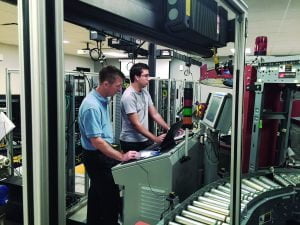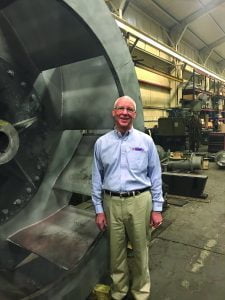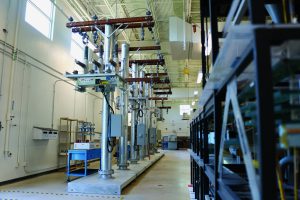Region takes steps to ensure industry builds on technological skills, workforce needed for success

Since the first steel mills opened along the Lake Michigan shoreline, Northwest Indiana has repeatedly proven highly adaptable to meeting the needs of manufacturing.
Still this unheralded sector of American productivity continues to be viewed as a dirty, dangerous industry despite the integration of 21st-century robotics, temperature-controlled environments, and careers offering high-tech, high-wage opportunities.
“Indiana is the most manufacturing intensive state in the nation, contributing nearly a third of the total state output and employing approximately 20 percent of the state's workforce,” said Brian Burton, president/CEO of the Indiana Manufacturers Association.
During the past decade, Indiana ranked second in the nation in manufacturing job growth despite a national trend of slowing growth in the sector, according to the Bureau of Labor Statistics. In April, Indiana’s workforce grew to 3.41 million workers, according to the Indiana Department of Workforce Development.
“Manufacturing is alive and well in Northwest Indiana,” said Roy Vanderford, director of business development for the Center of Workforce Innovations in Valparaiso. “It remains a major driver of economic health and growth here.”
Vanderford said the manufacturing sector is by far the largest contributor to the Gross Regional Product in the Region.
“And, as such, provides a solid base of incomes, wealth and tax support that enables other sectors to thrive,” he said.
Training resources
In April, Vanderford facilitated a “Manufacturing-Real Talk” session at the State of the Workforce conference. There he offered insights about a business sector that too many Hoosiers take for granted. For example, Indiana has the highest percentage of jobs tied to manufacturing at about 17 percent, with Northwest Indiana’s percentage at more than 13 percent, which is higher than both metro Chicago and the nation as a whole at 8 percent.
While the picture of manufacturing in Northwest Indiana is historically steel and heavy metal — and rightly so with 25 percent of the nation’s steel production coming from the Region — hidden beneath this figure are the numerous small- and medium-sized manufacturers that also operate throughout the area.
“We drive by many of these employers every day without having any idea what is going on inside their walls,” Vanderford said. “And what is going on is often quite amazing — very clean and very high tech, often integrating creatively with other sectors such as transportation, logistics, health care and agriculture.”
The growing challenge in 2019 and beyond is finding young, eager and educated workers to fill the ranks in these manufacturing businesses. ArcelorMittal, for example, took advantage of the state's Next Level Jobs program by reaching out to high schools and middle schools to help find students on industry-like career paths. This allows students to get hands-on experience while providing them with relevance about skills they’re learning at its training center.
“A pressing issue for manufacturing is securing enough of a workforce that has the technical skills capable of implementing and operating the advances in automation required to remain competitive in a global economy,” said James Higley, professor of Mechanical Engineering Technology at Purdue University Northwest. “Many industries have purchased modern equipment, even robots to support automation.”
Purdue University Northwest has partnered with industry to continually improve course content and laboratories to ensure that graduates are ready to be successful immediately upon entering the workforce.
The university’s college of technology works closely with local businesses and industry to ensure that its courses are application-oriented and include laboratories with state-of-the-art equipment. This ensures that graduates meet the increased technology demands of advanced manufacturing.
“This changing landscape of manufacturing requires a technology strong workforce,” said Deborah Blades, director of Industrial Relations and Experiential Learning at PNW. “Introducing middle- and high-school students to one of the many careers in manufacturing, while being transformed by automation, is one step in employing a new generation of manufacturing talent and advanced manufacturing within the Region.”
In the most recent statewide survey of Indiana manufacturers, 81 percent reported problems in recruiting young people into manufacturing. For those employers who stated jobs will be decreasing, 60 percent cited that the primary reason is “fewer young people going into manufacturing.”
Vanderford said this likely indicates some jobs are being eliminated by automation, and the sector now has entered a period when automation creates jobs requiring technical expertise that are difficult to fill.
Ivy Tech Community College’s Advanced Manufacturing, Engineering and Applied Science program offers innumerable courses:
- Advanced automation and robotics technology,
- Precision agriculture,
- Aviation management,
- Building construction management,
- Electrical engineering,
- Electronics and computers,
- Biotech and chem-tech,
- And heating ventilation and air conditioning, among them.
“In addition, we have numerous certifications and certificates that are credentials addressing various high-demand or high-wage positions in the industry,” said Sue Smith, vice president of the program. “As far as I know, we are the only college doing this technical interdisciplinary option, and it is, according to other colleges, revolutionizing higher education by aligning it with industry needs.”
Ivy Tech’s Smart Automation Certification Alliance is a nonprofit foundation with a mission to develop and deploy modular industry 4.0 certifications for a wide range of industries.
“We are well into the fourth industrial revolution in manufacturing, and we are working to embed the needed skills into our existing programs,” Smith said.
Global competition

Robert Migliorini, president of American Precision Services in Gary, which specializes in machining, grinding, welding and fabrication, agreed that manufacturing continues to be strong in Indiana, but during the past 20 years, competition has become more global.
“Many decisions being considered by manufacturers are increasingly being made with global implications in mind,” he said.
Migliorini said his company is continually training and recruiting so that the company remains competitive and aware of changes in technology.
“We have also made significant investments in updating our machinery and technology so that we remain a state-of-the-art machine shop,” he said.
Athula Kulatunga, department head of Engineering Technology at PNW, said the fourth industrial “revelation” is underway with fast-changing technologies and techniques. Dubbed “Industry 4.0,” the segment applicable to the manufacturing industry brings communication technologies, artificial intelligence, internet of things, and smart machines together to create intelligent, lean, and energy-efficient manufacturing. It’s all devised to compete in a highly competitive global marketplace.
“The skill gap has been growing for some time,” Kulatunga said. “Manufacturing companies complain about the difficulty of finding skilled engineers for current and future needs.”
His experiences as an educator in the vocational institute and as a professor at Purdue University in West Lafayette for more than 22 years convinced him to develop a completely different approach to train first-year college students and community youth.
A program called Discipline Specific Skill Acquisition is a college-bound skilled development program where learners become competent and confident in applying fundamental skills related to mechanical engineering technology, electrical engineering technology and mechatronics engineering technology. The DSSA program consists of modules that can be easily altered to fit industry needs and community-based skill development programs.
“We have tested some modules with 13- and 14-year-old students with great success,” Kulatunga said.
DSSA graduates possess the basics of modern design, simulation and hardware development tools to adopt new technologies into the existing manufacturing industry.
“The first cohort of the college-level DSSA program graduated in June,” he said.
Preserving manufacturing

In late 2018, the Lakeshore Chamber of Commerce established a Manufacturer’s Committee to, among other objectives, arrange tours of local plants and factories. In May, the committee took 24 Hammond school counselors on a tour of Hammond Machine Works, Beatty Machine/Bemcor and Tri-State Industries.
“The counselors had a multitude of questions, during and after their tours, relative to skills needed for employment,” said Dave Ryan, the chamber’s executive director. “From our recent tours, our manufacturing base in Hammond and East Chicago is bustling, with each of the plant managers currently in a hiring mode.”
Katie Eaton, president of the Michigan City Chamber of Commerce, said much of the workforce now entering the manufacturing sector is unfamiliar with the Region’s manufacturing history.
“While we still have manufacturers that have been in Michigan City for half a century or more — Michigan City Paper Box, Weil-McLain and Sullair to name a few — we also have manufacturers hitting their 20- or 25-year anniversaries.”
She said manufacturers, both old and new, continue to embrace innovative technologies and automation into their production lines.
“With the help of community partners like Center of Workforce Innovations, and state programs like Next Level Jobs, which provide upskilling and training specific to manufacturers, this Region will continue to be an attractive location for manufacturing companies to invest in,” Eaton said.
Bert Cook, executive director of the La Porte Economic Advancement Partnership, points to new production facilities, including Arconic — possibly among the most advanced aerospace manufacturing facilities in the world — adding high-tech sophistication to Northwest Indiana’s long-established manufacturing tradition. Other new additions to this sector include American Licorice, Jaeger-Unitek Sealing Solutions, Revere Packaging and MonoSol.
“While manufacturing has stepped back in parts of Northwest Indiana, this has not been the case in La Porte,” Cook said.
He cites the cross-training of personnel to implement new manufacturing technologies in multiple industries, along with manufacturers investing in upgraded equipment and processes. These investments create more efficient and sustainable business models, in addition to supporting their communities through property taxes.
“While it is true that we have workforce issues, so do all communities,” Cook said. “I strongly believe the manufacturing sector will be a strength of Northwest Indiana for years to come. Our population is made up of people who understand how to make things.”
Vanderford, from the Center of Workforce Innovations, said any discussion of manufacturing in this Region must include the impact of neighboring Chicago, the ninth largest economy in the world and the major economic driver for the entire Midwest.
“Manufacturers are already attracting workers from both Illinois and Michigan, with more … jobs coming to the manufacturing sector than any other sector,” he said. “Our competitive business climate in Indiana will continue to be attractive for employers in neighboring states as they look to expand or move production facilities.”
The new Ignite the Region economic development plan presents the case for growth of the manufacturing sector as part of a diversified portfolio for economic growth, noting the growth of all sectors accelerated by advances in technology. The plan states: “Tremendous productivity gains have enabled manufacturers to increase output, even as payrolls have declined.
To remain competitive, firms have increasingly turned to advanced processes for better, more efficient production. This too is the case in Northwest Indiana. The Region is a hotbed of companies and centers that are spurring new technologies and innovation.”
When asking a group of manufacturers several years ago for a definition of “advanced manufacturing,” one employer responded, “any manufacturer who is still in business.”
“In large part that’s true following the last recession, as employers had to utilize technology to remain competitive,” Vanderford said.
Compare that response with the most recent survey of Indiana’s manufacturers: “Investment in facilities, machinery and information technology” received a higher response as the most important priority than any time in the last five years of the survey.
“Schools, government and employers are all responding to the needs for upskilling,” Vanderford said.
A recent study by the Brookings Institution in Washington D.C. ranked Indiana as the most vulnerable state in the nation for job loss tied to automation, largely because of its reliance on manufacturing jobs. However, the report also noted that Indiana has the chance to take the lead in the nation in developing skills that align with new technologies.
“We are a manufacturing region, and we should continue to look to that as a great source of pride,” Vanderford said.
Several directives and suggestions are aimed at keeping manufacturing the backbone of this Region’s economic identity. For instance, a “mindset reset” is needed to showcase manufacturing as a viable career option, not an alternative to college but rather another route to higher education. Also, there is a call to change stereotypical perceptions produced decades ago. Instead, connect manufacturing to areas of student interest such as the green movement and social causes.
Higley of Purdue Northwest said the Region needs a public awareness campaign with the sustained message: “manufacturing is cool.”
“The Region has good infrastructure to support manufacturing and the quantity of skilled people is increasing, so I see a bright future for manufacturing in Northwest Indiana,” he said.
Click here to read more from the Aug-Sep 2019 issue of Northwest Indiana Business Magazine.

